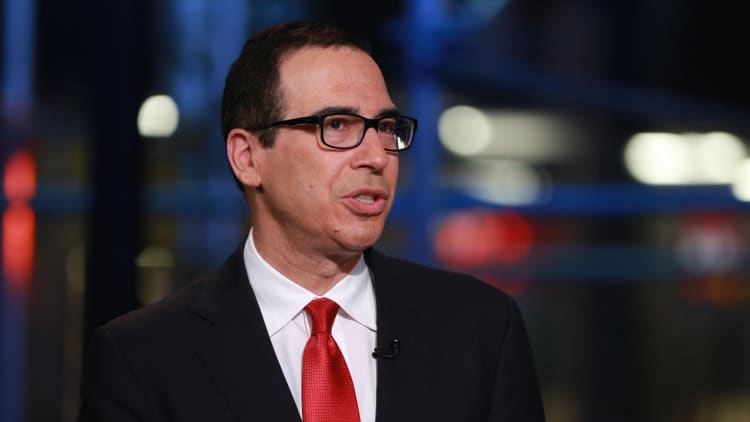
Steven Mnuchin started his career as a trader.
He now appears to have made the political trade of a lifetime: His early pledge of loyalty to the campaign of President-elect Donald Trump has landed him the job of secretary of the Treasury. The position is expected to be announced on Wednesday, people close to the transition said.
Up until the last several weeks, Mr. Mnuchin — an entrepreneur, a Wall Street investor and a Hollywood producer — would have appeared an unlikely choice for the position made famous by Alexander Hamilton. Over his business career, he was never particularly involved in politics, nor did he publicly express an interest in public policy. He never ran a large organization or showed himself to be an accomplished economist.
More from The New York Times:
More Law Degrees for Women, but Fewer Good Jobs
A New Strategy for Shareholder Activism: Engagement
HedgeFund Settlement With Labor Board on Worker Rights Stays Secret
With his appointment to the Treasury, Mr. Mnuchin would be sidestepping — or passing over — the more conventional paths to having his signature on United States currency and an office neighboring the White House.
On the surface, all of that may make Mr. Mnuchin an outsider of sorts. But he is very much a part of the firmament of the finance world, even if he never reached the corner office of one of Wall Street's top firms.
He started his career at Goldman Sachs, where his father, Robert, was a legendary trader. He then worked for his Yale roommate, the hedge fund manager Eddie Lampert, who runs Sears Holdings, and later for George Soros, before striking out on his own — with the backing of Mr. Soros — to start Dune Capital Management.
He has spent much of the last decade on the West Coast, where his firm bought IndyMac, a bankrupt housing lender, in 2009 from the Federal Deposit Insurance Corporation, and rebuilt it under the name OneWest before selling it for an enormous profit to the CIT Group in 2015.
Along the way, he also developed a side business as a financier of many Hollywood hits. His name regularly appears in the credits of films. Just in the past year, he produced "Sully," "Storks," "The Legend of Tarzan" and "Batman v Superman: Dawn of Justice."
Mr. Mnuchin is known as a smart, hard-working, talented executive. Henry M. Paulson Jr., the former Treasury secretary who was critical of Mr. Trump during the campaign, was very complimentary of Mr. Mnuchin's performance at Goldman Sachs.
"I think Steven Mnuchin would be an excellent choice for Treasury secretary," Mr. Paulson said on Tuesday evening. "He is very talented, has a deep understanding of finance and markets, he knows how to bring people together to get things done, and — importantly — he has a working relationship with and the confidence of the president-elect."
That confidence and loyalty appear to be what clinched the role for Mr. Mnuchin. Unlike several Trump insiders who have publicly campaigned for jobs, Mr. Mnuchin has remained relatively behind the scenes and never seemed to seek the spotlight.
While Mr. Mnuchin, who served as the Trump campaign's national finance chairman, was always considered the probable pick for the Treasury, Mr. Trump spent the last two weeks considering others. The most prominent was Jamie Dimon, JPMorgan Chase's chief executive. Others on the shortlist included David McCormick, president of the hedge fund Bridgewater Associates and the former under secretary of the Treasury for international affairs, according to people involved in the process.
It is hard to discern what policies Mr. Mnuchin will seek to enact beyond those espoused by Mr. Trump. Like the president-elect, he has talked about lowering taxes and lifting regulations, but mostly without describing specifics.
While Mr. Mnuchin's deepest relationships are with hedge fund managers, investors and big names in Hollywood — less so among the chief executives of the biggest banks and multinational companies — he is expected to be welcomed as what one former colleague described as one of the adults in the administration that the industry will feel it can work with.
Still, he is expected to face a steep learning curve when it comes to working on international trade, where he doesn't have much previous experience. And even though he both an insider and an outsider, some of Mr. Trump's supporters and critics may see him as too much of the former.
Mr. Trump criticized Goldman Sachs, Mr. Mnuchin's former employer, during the campaign, as well as Hillary Clinton for giving paid speeches to the bank.
But anyone looking for hints about Mr. Mnuchin's ideology may be disappointed: His friends say he is not ideological and that, if anything, his ideology is simply his ambition.
When Mr. Mnuchin decided to back Mr. Trump — much to the horror of some of his friends and peers — he explained it to Bloomberg Businessweek the way a trader would: "Nobody's going to be like, 'Well, why did he do this?' if I end up in the administration."


